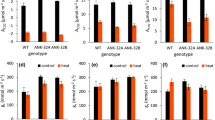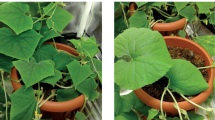Abstract.
The adaptive responses of the greening process of plants to temperature stress were studied in cucumber (Cucumis sativus L. cv. Poinsette) seedlings grown at ambient (25 °C), low (7 °C) and high (42 °C) temperatures. Plastids isolated from these seedlings were incubated at different temperatures and the net syntheses of various tetrapyrroles were monitored. In plastids isolated from control seedlings grown at 25 °C, the optimum temperature for synthesis of Mg-protoporphyrin IX monoester or protochlorophyllide was 35 °C. Temperature maxima for Mg-protoporphyrin IX monoester and protochlorophyllide syntheses were shifted to 30 °C in chill-stressed seedlings. The net synthesis of total tetrapyrroles was severely reduced in heat-stressed seedlings and the optimum temperature for Mg-protoporphyrin IX monoester or protochlorophyllide synthesis shifted slightly towards higher temperatures, i.e. a broader peak was observed. To further study the temperature acclimation of seedlings with respect to the greening process, tetrapyrrole biosynthesis was monitored at 25 °C after pre-heating the plastids (28–70 °C) isolated from control, chill- and heat-stressed seedlings. In comparison to 28 °C-pre-heated plastids the percent inhibition of protochlorophyllide synthesis in 40 °C-pre-heated plastids was higher than for the control (25 °C-grown) in chill-stressed seedlings and lower than for the control in heat-stressed seedlings. Maximum synthesis of total tetrapyrroles and protoporphyrin IX was observed when chloroplasts were heated at 50 °C, which was probably due to heat-induced activation of the enzymes involved in protoporphyrin IX synthesis. Prominent shoulders towards lower or higher temperatures were seen in chill-stressed or heat-stressed seedlings, respectively. The shift in optimum temperature for tetrapyrrole biosynthesis in chill- and heat-stressed seedlings was probably due to acclimation of membranes possibly undergoing desaturation or saturation of membrane lipids. Proteins synthesized in response to temperature-stress may also play an important role in conferring stress-tolerance in plants.
Similar content being viewed by others
Author information
Authors and Affiliations
Additional information
Received: 8 October 1998 / Accepted: 19 November 1998
Rights and permissions
About this article
Cite this article
Tewari, A., Tripathy, B. Acclimation of chlorophyll biosynthetic reactions to temperature stress in cucumber (Cucumis sativus L.). Planta 208, 431–437 (1999). https://doi.org/10.1007/s004250050579
Issue Date:
DOI: https://doi.org/10.1007/s004250050579




